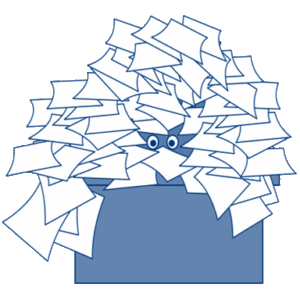Though mostly retired from paid employment, I still like to fill my day with meaningful tasks and go to bed at night with a feeling of accomplishment. I’m open to ideas that will help me feel greater satisfaction out of my waking hours. David Allen’s book – Getting Things Done: The Art of Stress Free Productivity – fit the bill. While the title suggests it’s just one more way to simply check more things off the “to do” list, the author has a loftier goal. He wants us to have more energy, feel more relaxed, and have more clarity in the moment. As he puts it: “Be effectively doing while you are delightfully being.”
 Allen’s methodology challenges us to capture all of the things that might need to get done now or later and get them out of our heads and into a trusted system. Why? It turns out that unfulfilled commitments large and small (a.k.a. “open loops”) take up space in our consciousness and drain energy and focus. They stand ready to hijack our attention while doing something else or keep us up at night when we should be getting restorative sleep. That being said, the manner in which we process the resulting list and develop systems to track progress matters greatly.
Allen’s methodology challenges us to capture all of the things that might need to get done now or later and get them out of our heads and into a trusted system. Why? It turns out that unfulfilled commitments large and small (a.k.a. “open loops”) take up space in our consciousness and drain energy and focus. They stand ready to hijack our attention while doing something else or keep us up at night when we should be getting restorative sleep. That being said, the manner in which we process the resulting list and develop systems to track progress matters greatly.
As we contemplate each item on the list, we need to ask ourselves: Why does this item matter to me? What commitment(s) have I made to myself or others about it? What deadline(s) have I set? How do I define “done” (outcome) and “doing” (action)? What is the next step to make progress? If the task does not hold up to scrutiny, we may decide to jettison it. If it holds interest but requires no action, we close the loop by filing the item away for future reference or placing it in a tickler file for consideration at a later date. If action is required, we can do it, delegate it, or defer it and use a reliable tracking system to free up our brains from fussing about it. (Allen suggests that we knock out any item that takes <2 minutes – i.e., just do it!) Every “open loop” should have a next action and associated due date and system for prompting action.
Of course, we may still face the age-old dilemma of having too much to do and not enough time to do it. Allen presents a “natural planning model” to align our priorities with how our brains work.
- Define purpose and principles. Purpose clarifies why the task earns a spot on the list and provides guideposts for success, decision-making, resources, and options. Principles tell is what behaviors are in and out of bounds as we proceed.
- Envision outcomes. We need a clear sense for what we’re trying to accomplish by articulating what success looks, feels, and sounds like. This clarity ensures our actions stay on course.
- Brainstorm. We capture ideas without judgment to load up on options for consideration in achieving our objective(s).
- Organize. We identify natural relationships and structure, constituent pieces, sequences of events, and priorities in sufficient detail to create an actionable plan.
- Identify next action(s). The rubber meets the road in this final step. We ask ourselves: Are we really serious about taking this task or project on? If so, who will do what by when?
Having gone through the process of creating the master list, we can create our own system to manage it or take advantage of an app to do that work for us. On a weekly basis, we are encouraged to:
- Process all of the new stuff that vies for our attention and decide what (if anything) to do about them – including the all-important next action
- Review the system to ensure that it is still set up to meet our commitments and desired outcomes
- Update short-, medium-, and long-term task lists
- Get clean, clear, current, and focused
The more complete the system – and the more we work it – the more we trust it. Allen warns against getting paralyzed in the process or allowing ourselves to procrastinate. We don’t have to get it all done now! In fact, the beauty of sustaining focus on the next action is that we make our lives easier all the while gaining clarity, accountability, productivity, and empowerment.
While we may pride ourselves in having a good memory, the mind really isn’t designed to manage projects and tasks on its own. We can relieve our cognitive load and have more energy for projects, tasks, people, and fun if we let external systems do some work in our behalf. Allen promises rewards in psychology capital – self-efficacy, optimism, hope, and resilience.